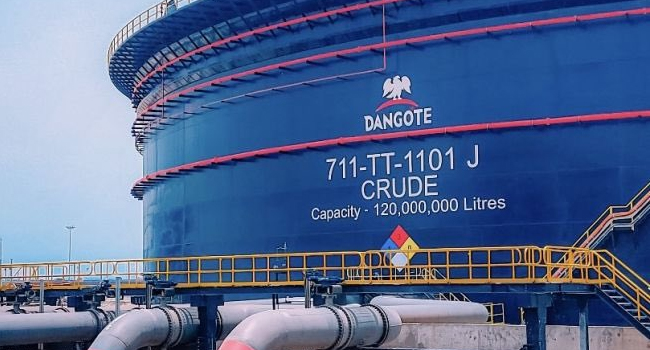
Our petrol will be exported if NNPCL and Nigerian marketers refuse to patronize – Dangote refinery
The Dangote Petroleum Refinery has announced that if the Nigerian National Petroleum Company Limited (NNPC) and other local petroleum distributors do not engage with its offerings, the refinery will be compelled to export its Premium Motor Spirit (PMS), commonly known as petrol.
On Monday, Devakumar Edwin, Vice President of Oil and Gas at Dangote Industries Limited, shared this information during his appearance on the Brekete Family live show. Edwin confirmed that the refinery had commenced petrol production, but noted that local traders are focusing on importing diesel and aviation fuel instead of purchasing Dangote’s petrol.
Edwin detailed that while the refinery has been producing aviation fuel, kerosene, and diesel, it began producing PMS the previous day, marking the final phase of its refining process, with petrochemicals remaining as the only unproduced item.
Despite the positive development of beginning petrol production, Edwin expressed frustration at the lack of local sales, attributing this to a blockade by traders and an unwillingness by local buyers and NNPC to purchase the refinery’s products. Consequently, the refinery is prepared to export petrol if necessary, mirroring its approach with aviation jet fuel and diesel.
Edwin voiced his dismay over unexpected challenges encountered since the refinery’s operational launch, reflecting on the initial goal of adding value to Nigeria’s crude oil by refining it domestically rather than exporting it in raw form. He lamented that, despite decades of effort, Nigeria continues to export crude oil while importing refined products.
He elaborated that the refinery has struggled with inadequate local crude supply and is now importing crude from international sources such as the US and Brazil. This situation is contrary to the Petroleum Industry Act’s stipulation that local refineries should be supplied with sufficient crude before any exportation.
To address the local crude shortage, the refinery is constructing four crude oil storage tanks, each with a 120 million-litre capacity, to accommodate imported crude and manage shipping delays.
Edwin also noted that despite the refinery’s capacity to load 2,900 tankers daily, local demand has been minimal, with less than 5% of the gantry’s capacity being utilized. This low local engagement is partly due to established traders’ reluctance to support new local production, opting instead to block the sale of Dangote’s products.
Regarding product quality, Edwin assured that the refinery employs top-tier laboratory facilities and produces petrol that meets the Euro 5 standard, the highest grade accepted in Europe and the US. He highlighted that Dangote’s products are of superior quality, low in sulfur, and environmentally friendly, with aviation jet fuel already being exported to Europe.
Edwin addressed concerns about Aliko Dangote, the president of Dangote Group, being accused of monopolistic practices. He emphasized that Dangote’s profits are reinvested into Nigeria, fostering local job creation and economic growth, rather than being siphoned off to foreign bank accounts or investments. Edwin stressed that Dangote’s investments focus on manufacturing and wealth creation within Nigeria, countering claims of monopolistic behavior.
Industry sources have confirmed that Dangote’s petrol is expected to enter the market soon, with ongoing discussions between the government and Dangote Group about the distribution and sale of the product.




